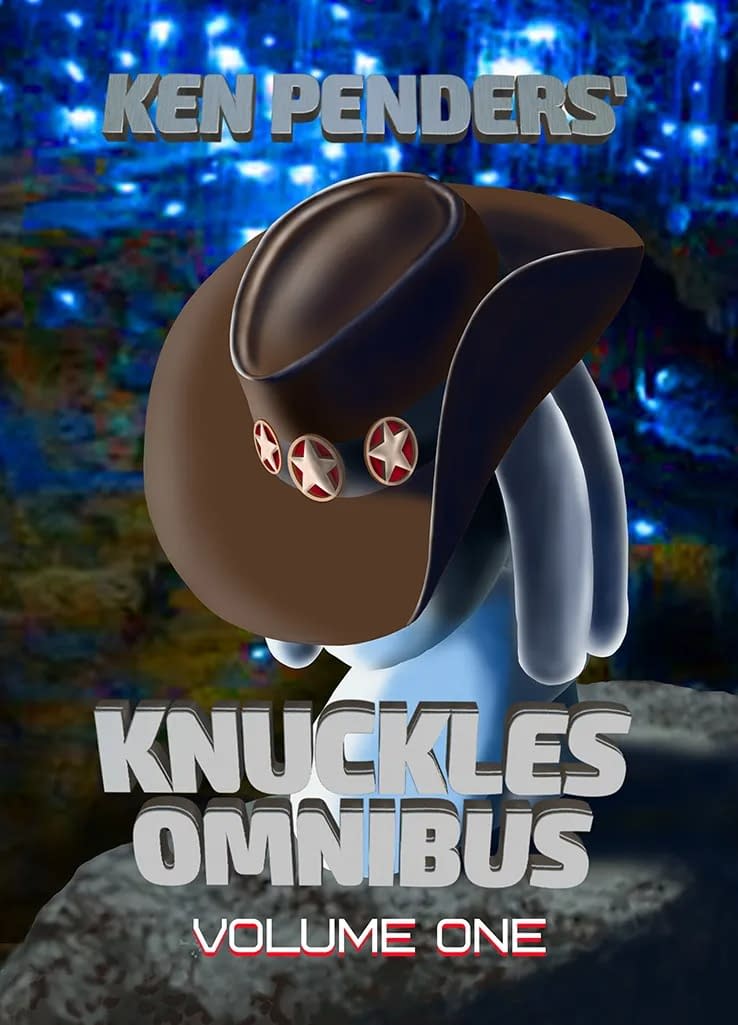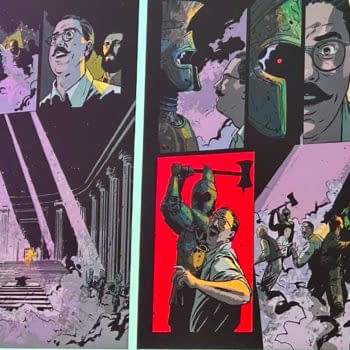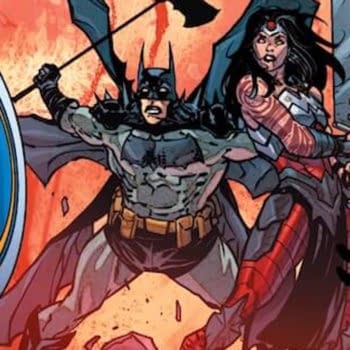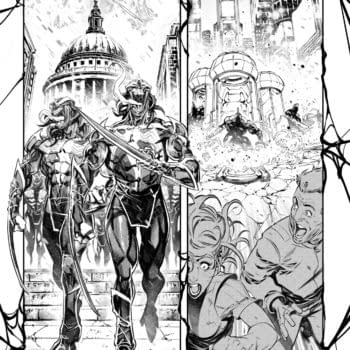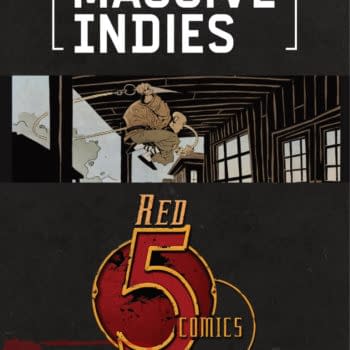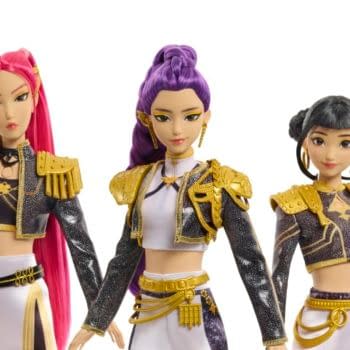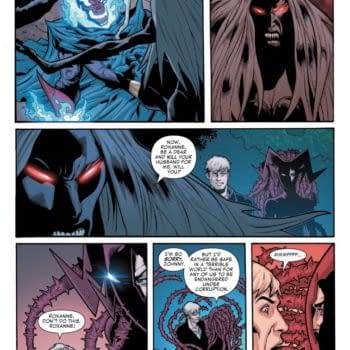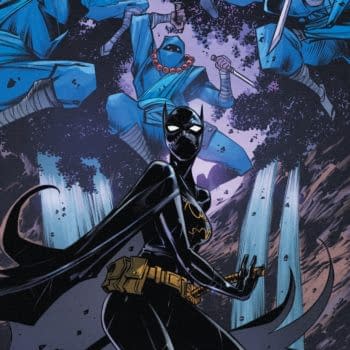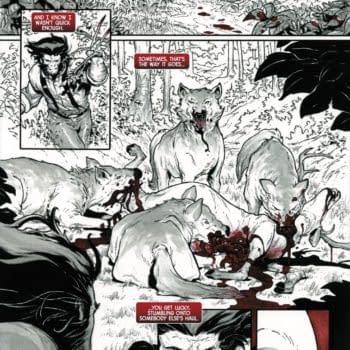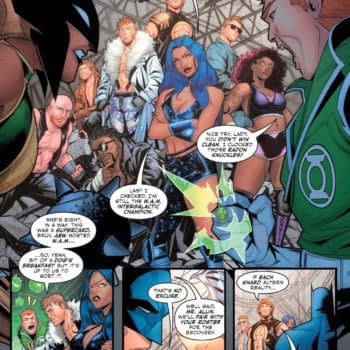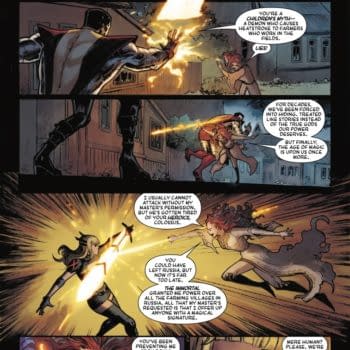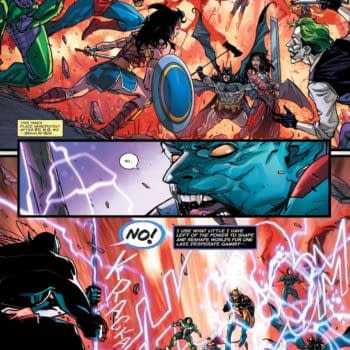Posted in: Archie, Comics | Tagged: ken penders, sega, sonic, sonic the hedgehog
Ken Penders Vs Archie Comics Vs Sega Over Sonic The Hedgehog Comics
Ken Penders Vs Archie Comics vs Sega Over Sonic The Hedgehog Comics, Revisited
Ken Penders was the author of many Sonic the Hedgehog comic books published by Archie Comics, which was followed by half a decade of fighting with both Archie and Sega over the legal rights to the characters created for the series. A battle that saw him at one point get Diamond to decease from distributing Sonic comics, and after significant legal wrangling at the highest levels, resulted in a settlement between Archie Comics and Ken Penders, "which allowed for both sides to proceed with the 18 characters and stories created by Ken Penders for their respective projects."
Ken Penders has now co-authored a new law review article with the Berkeley Journal of Entertainment & Sports Law Vol. 15 (Forthcoming, 2026), titled The Legacy of the Ken Penders Legal Cases and Possible Copyright Infringement Lingering Over Sega's Sonic the Hedgehog Series, with Nicholas James Stamates, a University of Michigan Law School graduate and attorney. It argues that Penders' protracted lawsuits against Archie Comics and Sega of America have reshaped the media landscape for the blue hedgehog's universe, while exposing deep flaws in American creator rights, when compared to protections in other countries such as Japan and France. Oh, and Bleeding Cool gets a lot of references and citations.
Archie Comics published Sonic the Hedgehog titles from 1993 to 2017, licensed from Sega, and became the longest-running comic book series based on a licensed property. However, a "copyright mess" erupted after Ken Penders, a key writer and artist on the series, filed copyright registrations for stories and characters that he had created for the comic, prompting legal action from Archie and Sega. Ken Penders contributed to the Sonic the Hedgehog and Knuckles the Echidna series from its early days until Ian Flynn took over with Sonic Issue #160 in 2006, then engaged in legal battles from 2009 to 2013. The disputes centred on whether his work qualified as "work made for hire" under US copyright law, which would have transferred ownership to Archie and Sega. Especially as Sega then used aspects from the comics in their games.
Sonic Chronicles: The Dark Brotherhood
According to the new paper, Sonic Chronicles: The Dark Brotherhood, a Nintendo DS game from 2008 included "a character named Shade who bears a striking resemblance to Julie-Su outside of coloration and the Dark Legion concept with the Nocturnus Clan being a similarly cyberpunk-inspired bunch of evil Echidnas that were banished and trying to escape an alternate dimension… After the game was released, fans of his pointed out the similarities between the storyline of the game and his Knuckles Comics…. Ken Penders stated that in December 2008, he contacted Victor Gorelick, editor-in-chief of Archie Comics, requesting the return of original artwork and copies of any agreement he may have signed relating to his freelance work. Penders claimed Gorelick informed him that no such documents existed."
In 2009, Ken Penders started certifying copyright claims on every story he wrote and/or pencilled for Archie Comics. In 2010. Archie Comics sued Ken Penders, "claiming that there was a work for hire agreement but that the original burnt down in a fire and that his actions were tortuous interference with their contract with Sega." Penders "responded with counterclaims against Archie Comics and filed his own lawsuit against Sega of America and Electronic Arts, the owners of BioWare that made Sonic Chronicles: The Dark Brotherhood, for copyright infringement." The lawsuits culminated in a 2013 settlement with Archie Comics and dismissals of claims against Sega. Subsequently, Archie Comics rebooted the nearly 20-year-old Sonic comic continuity. Archie continued to publish Sonic comic books until the end of 2016. On July 21, 2017, IDW announced that they had picked up the Sonic comic book license. Sonic writer Scott Fulop through his company Narrative Ark Entertainment LLC filed suit against Archie under similar circumstances in 2016. In 2022, Penders contemplated legal action against Paramount over Sonic the Hedgehog 2.
A history of creators suing publishers
Ken Penders traces such disputes back to the early 1900s, citing cases like the 1906 New York Herald Co. v. Star Co. involving the comic strip Buster Brown, and the 1914 Star Co. v. Press Publishing Co. over Katzenjammer Kids. The paper highlights Marvel Comics' controversial handling of Captain America royalties for creators Joe Simon and Jack Kirby, and founder Martin Goodman's sale of film rights to Republic Pictures during World War II without compensating them. "In the 1940s, Timely Comics founder Martin Goodman gave the rights to a Captain America film to Republic Pictures without giving any money to Joe Simon and Jack Kirby or even telling them, as the former found out about the movie through walking the streets of Baltimore one night during World War II." It also references Carl Burgos' attempt to reclaim rights to the Human Torch in the 1960s, which ended with him discarding his own Marvel artwork after Marvel bypassed his claims by creating a new version of the character for The Fantastic Four. "Marvel Comics used to have creators 'sign over their rights' to their characters as part of signing their paystubs," the paper notes, underscoring a "culture of creator neglect and publisher-centric running of the industry" that persists today.
The paper states that the modern framework for "work made for hire" stems from the 1976 Copyright Act, refined by the US Supreme Court's 1989 ruling in Community for Creative Non-Violence v. Reid. In Penders' case, the key Reid factors were whether he was an employee (he was an independent contractor, undisputed) and if he signed a work-for-hire agreement. "This was not a dispute of law but a case where there was a dispute of fact over an alleged work-for-hire agreement that Ken Penders was said to have signed with both sides accusing each other of lying," the analysis states. Penders states that he initially believed that Sega's contract with Archie automatically transferred his characters' rights to them, but he later discovered this was not the case. "Ken Penders claims he was misinformed, which, considering Sega and Archie Comics never produced this document in the legal cases involving Ken Penders, lends credibility to this claim," the paper adds. In stark contrast, the document praises Japan's copyright system, where "moral rights" – including the right to make a work public, indicate authorship, and preserve integrity – are inalienable and always belong to the creator, even in work-for-hire scenarios. Economic rights, like reproduction and distribution, can be transferred but require registration. "They are non-transferrable and will always belong to the author of the work; the author can never be 'erased' even if the copyrighted material was created as a work-for-hire," it quotes from a 2016 Washington University Global Studies Law Review article. France shares this "moral rights" vs. "economic rights" divide, rooted in Lockean property theory but diverging from the US model, which inherited a less creator-friendly structure from the UK. "American and French copyright laws have a similar origin in Lockean theory of property rights but would end up diverging with the American system over time," the paper observes. The analysis argues that without a valid work-for-hire agreement, creators like Penders retain rights to derivative works. The paper suggests Sega and Archie may have assumed the comics were derivatives of the Sonic games, automatically retaining copyrights. However, this contradicts industry norms: "If the comic writers and artists are creating something new, they own the rights to it under American copyright law."
Sonic The Hedgehog movies and the broader implications for licensed properties
The paper warns that these cases raise broader questions for licensed properties: "The rights of a copyright owner for derivative or licensed works are as follows, and either Sega through Archie Comics or Ken Penders had these rights for the characters and stories the latter created during his run on the Sonic and Knuckles comics." As Sonic's media empire expands with the movies, the authors conclude that the legacy of these disputes underscores the need for stronger U.S. creator protections, potentially influencing future litigation in the comic industry. The paper states that "Ken Penders has threatened to sue over the depiction of the echidnas in the recently released 'Sonic the Hedgehog 2' movie by Paramount" though notes that "no lawsuit ever materialized but the threat of one is ever present because as Ken Penders put it he is responsible for so much of the western Knuckles the Echidna lore which would be his moral rights for these characters and concepts outside of Knuckles himself under the copyright laws of Japan and France".
A Catch-22 of licensed comic books
Ken Penders also refers to a Catch-22 on licensed properties being reprinted and collected, specifically Star Trek comics he worked on for DC Comics in the eighties that "included royalties at a rate of $32 a page for each page reprinted" but that "creators who worked on licensed titles specifically would learn there was no enforcement mechanism for any publisher who reprinted this material. Thus when various STAR TREK creators approached IDW for royalties as a result of IDW reprinting their DC work, IDW would point to Paramount as the owner of the works and thus the party to deal with. When the creators approached Paramount, they were told they had to take grievances to DC Comics, who in turn stated that since they no longer had the TREK license, the creators should go back to Paramount." As well as noting some missed items along the road, "Dreamworks, after producing Prince of Egypt, reached out to Ken Penders about the rights to do a movie based on the Knuckles Comics, which Sega never acted on."
- Knuckles Omnibus
- The Lara-Su Chronicles Beginnings
While Ken Penders "has used the settlement to publish not only his own original work, The Lara-Su Chronicles Beginnings in 2024, as continuation to his Mobius 25 years later storyline from Archie Sonic without the Sega characters, but also reprints of the Archie Sonic comics in collaboration with the other former Archie Sonic creators since as previously stated they own the rights to those works." In June this also saw the release of Knuckles Ombibus Volume One "which collected his stories that featured Sega Sonic characters in them including Sonic and Knuckles" to be followd up by Ken Penders establishing a new publishing label Angel Island Productions, including work from another Archie Sonic contributor, Scott Shaw.


